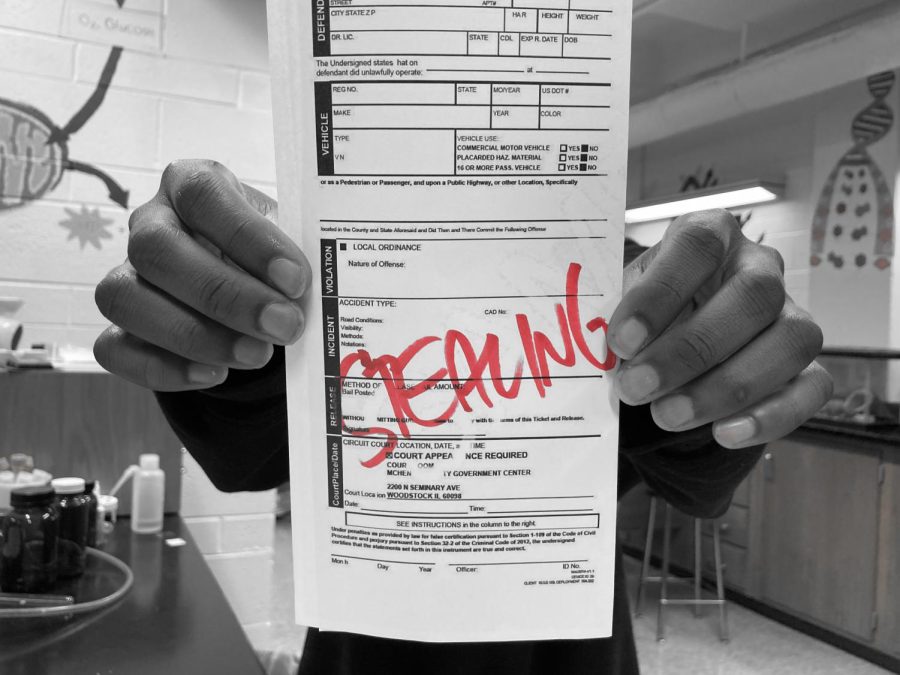The deans of students
May 19, 2023
Despite a state law that says “A student may not be issued a monetary fine or fee as a disciplinary consequence,” students at MCHS continue to receive tickets from the McHenry Police Department for their behavior in school.
In addition to two student resource officers, MCHS has three deans of students. They describe behavior as “significantly more challenging” than before the pandemic, noting increasing fights, vapes, and drugs.
“I think [behavior has] improved compared to last year,” Dean Brian Wilbois said. “I was a teacher last year, so I had a different perspective. I know last year there were a lot of challenges with the new building and learning model. I would say things are better, but with still more work to be done.”
The behaviors that are increasing are the behaviors receiving tickets. Up until April, there were 81 tickets issued this year at MCHS.
“We involve the SROs usually for things that we know are illegal, like fighting, battery, drugs, and things like that,” Dean Hilary Agnello said. “We involve them when we know something falls under that category. It’s not like, ‘I don’t like that kid. I’m gonna get the police officer involved.'”
Agnello explains that tickets are not “consequences” since SROs are only stationed at the campuses and are not employees. MCHS issues separate consequences for misbehavior.
“Consequences can vary,” Wilbois said. “Sometimes it’s a student conference, if it’s the first time it’s happened and depending on the severity. It could be a warning. We have detentions. And all the way, depending on the severity, it could be in-school or out-of-school suspensions.”
When referring students to SROs, though, deans ensure ticketing is used appropriately through consistency. For example, Wilbois says that any time a student has a THC card, the SRO is involved. I don’t want people coming here and getting in fights. I don’t want people getting hurt. If they decide to [pass the bill], all they did was make a school the one place that you can commit crime. I don’t think that’s fair to the kids here who don’t do illegal things. — Hilary Agnello, Upper Campus Dean of Students
“We try to be very consistent across all the deans,” Agnello said. “We’re all very, very consistent. We talk to each other to make sure we’re not referring if things are personal or out of the norm. So, in terms of being fair, we really try to be consistent.”
Aside from a ticket and school consequences, there is counseling involved. Particularly for drug offenses, students meet with MCHS’ prevention and wellness coordinator.
“We do offer counseling,” Agnello said. “We always offer counseling. That’s a given. Not everyone takes it. You look both at the helping capacity, which we definitely do, but there’s also the matter of, if it’s illegal, it’s illegal. If you were caught at a mall or at a restaurant, and you were underage doing drugs or getting in a fight, it doesn’t matter where you are. That’s a police consequence.”
Ultimately, through ticketing, the goal is to reduce behaviors and create a safe school environment. Wilbois compared ticketing for misbehaviors to speeding tickets; they are deterrents.
“We are trying to create a safe environment,” Wilbois said. “An environment free of drugs, fighting, or weapons, just like [police] do outside of school. We are trying to make it as safe as possible for students and staff … I would hope [a ticket] serves as a deterrent. I’m sure, for some people, it’s a wake up call, and for others, that might not be.”
The deans are aware of HB3412 to end ticketing for disciplinary problems. Agnello believes the bill is not the right approach and would make schools “the only place where you can commit crimes.”
“I don’t want school to be the place where kids come to sell drugs,” she said. “If they find a place where they could do that without breaking the law, we’re going to get flooded with it. Plus, I don’t want people coming here and getting in fights. I don’t want people getting hurt. If they decide to [pass the bill], all they did was make a school the one place that you can commit crime. I don’t think that’s fair to the kids here who don’t do illegal things.”
Some see ticketing students and having them go through court as “traumatizing.” Agnello says the actions that warrant ticketing should in themselves be traumatizing.
“It should be scary to get caught selling drugs,” she said. “It shouldn’t be okay. It should be scary to be caught hurting someone. That should never be okay. So if you are doing something like that, I look at the victim. That is not fair to them. That is how I see it.”
